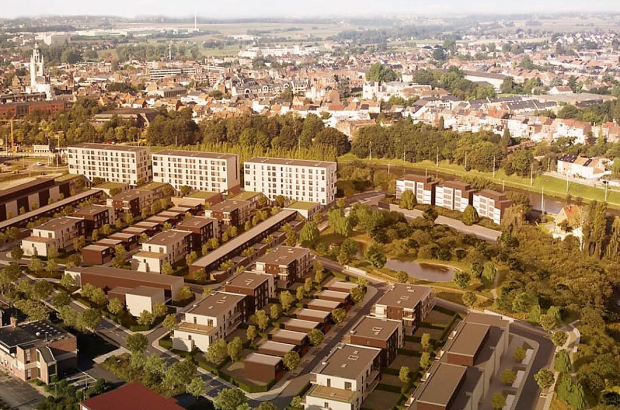- Daily & Weekly newsletters
- Buy & download The Bulletin
- Comment on our articles
Flemish Brabant approves permit for new housing in floodplain
The province of Flemish Brabant has approved a building permit for three apartment blocks on the banks of the Senne river in Halle – a permit that had been refused by the city itself because of the risk of flooding.
The group of flats will be built on Jean Laroystraat in the new Nederhem neighbourhood, developed by Van Roey Vastgoed and Matexi. The development project, just northeast of Halle city centre, consists of a number of new row houses and apartment blocks.
Most of the Nederhem project is complete, but three more buildings are still to come, on a piece of ground between the Brussels-Charleroi canal and the Senne river. The ground was zoned for construction, but the city refused to issue a building permit earlier this year because of the risk of flooding.
The developers appealed the decision to the province, which granted the permit. “I personally find it a very strange decision,” Halle housing councillor Marijke Ceunen (Groen) told VRT. “We made our feelings clear that building in a flood plain at this point in time is unacceptable.”
‘Too little research’
Ceunen is referring not only to the climate crisis in general but the devastating floods that hit Wallonia just last month. The city council denied the permit months ago, and its decision was only reinforced by recent events.
“We have entered a period of flooding, as we see with what has happened in Wallonia,” said Ceunen. “It is terribly unfortunate that the province would still go ahead with such a decision.” When the city denied the permit last January, the mayor pointed out that it was 15 years ago that the original plans were developed.
According to provincial deputy Tom Dehaene (CD&V), the province followed the advice of the Flemish government’s environmental agency when overturning Halle’s decision. “They advised approval based on changes the developers made to the original plan for the cellars,” he told VRT. “They came up with a concept that took into account potential flooding. We also approved the permit on the condition that an extra 10,000-litre rainwater tank be installed.”
Ceunen isn’t sure that is enough. “There has been too little research done on the flood risks in this neighbourhood,” she said.




















Comments
Well, that was a rather stupid decision bearing in mind the floods that there have been in Belgium this year. Building on flood plains is always stupid as the plains are there in case the river overflows its banks!!!